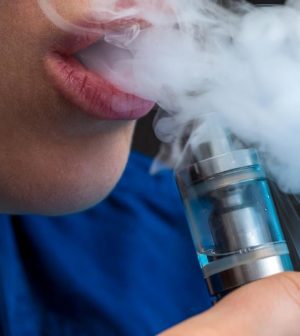- Could Your Grocery Store Meat Be Causing Recurring UTIs?
- Are You Making This Expensive Thermostat Error This Winter?
- Recognizing the Signs of Hypothyroidism
- 10 Strategies to Overcome Insomnia
- Could Artificial Sweeteners Be Aging the Brain Faster?
- Techniques for Soothing Your Nervous System
- Does the Water in Your House Smell Funny? Here’s Why
- Can a Daily Dose of Apple Cider Vinegar Actually Aid Weight Loss?
- 6 Health Beverages That Can Actually Spike Your Blood Sugar
- Treatment Options for Social Anxiety Disorder
Kids Still Find It Easy to Buy Flavored Vapes Online

If you think that federal restrictions on the sale of tobacco products make it nearly impossible for your teen to buy vapes online, new research suggests you’re mistaken.
In 2020, the Preventing Online Sales of E-Cigarettes to Children Act banned e-cigarettes and vaping products from being shipped through the U.S. Postal Service and introduced an ID scan requirement to accept deliveries of such items. But while sales of flavored tobacco products have been restricted in eight states and nearly 400 cities or counties, those regulations don’t fully cover online shopping, researchers report.
“We knew that there is a well-established system for monitoring brick-and-mortar retailers’ compliance with tobacco policies, but there is not one for online sales,” study author Raquel Harati, a former research coordinator for the University of California, San Diego’s School of Public Health, told CNN. “So we wanted to develop a method of systematically checking for compliance online.”
For the study, published Monday in the journal JAMA Network Open, researchers looked at attempts to buy flavored nicotine vaping products from 78 websites and have them delivered to private homes.
What did they discover?
Among 105 deliveries, delivery personnel scanned the receiver’s ID only one time. Most of the products (78%) were delivered with no delivery interaction, 16% spoke with delivery personnel with no ID check and only 5.7% had their ID checked but not scanned.
“These results demonstrated pervasive non-adherence to age verification, shipping and flavored tobacco restrictions among online tobacco retailers,” the researchers wrote in their study. “Jurisdictions should consider whether to permit online tobacco sales and, if permitted, ensure that retail policies such as flavor restrictions unambiguously cover online sales.”
The researchers noted that roughly 80% of the orders were delivered by U.S. Postal Service (USPS).
“There is a federal law that very clearly states that USPS cannot be used to ship tobacco products, but it is clearly still being used frequently,” Harati said. “Health experts should advocate for more routine compliance assessments among online retailers, to prevent youth access.“
In 2019, Congress raised the legal purchasing age for tobacco products from 18 to 21, including a requirement for retailers to verify photo ID.
However, “age-gating technology on these websites don’t actually work,” Thomas Carr, director of national policy for the American Lung Association, told CNN. “People will not tell the truth when they enter their age, and it’s remarkably easy for kids to get tobacco products mailed to them. At brick-and-mortar stores, you have a clerk who could check ID and actually look at the person, which you can’t do online.”
Vaping products use a liquid solution that contains nicotine, a highly addictive substance. That makes those products tough to quit, especially when they come in fruity flavors that appeal to youth.
“Young people are particularly susceptible to the addictive properties of nicotine,” Harati explained. “Their brains are still developing and forming neural networks that regulate their emotions, and nicotine strongly impacts those networks.”
In August, the American Lung Association, the American Academy of Pediatrics and several other health organizations urged the U.S. Food and Drug Administration to close these online loopholes.
“Prohibiting tobacco sales completely, or states putting some more restrictions on how the products are delivered to people, can help make e-cigarettes harder to purchase,” Carr said. “Reducing the attractiveness of the products can help, too.”
More information
The CDC has more on protecting teens against the dangers of vaping.
SOURCE: JAMA Network Open, Nov. 12, 2024; CNN
Source: HealthDay
Copyright © 2026 HealthDay. All rights reserved.










